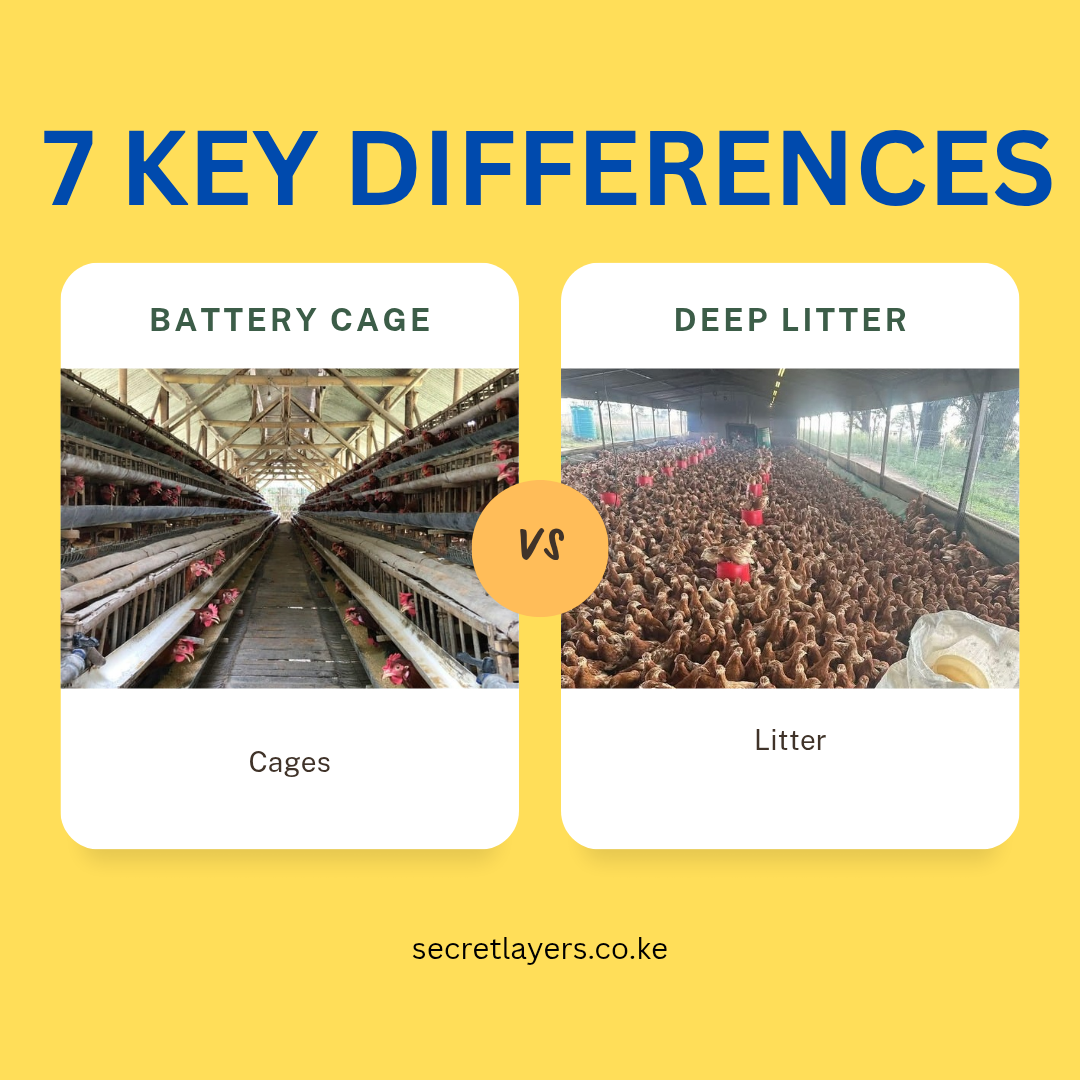Battery cage vs deep litter system is one of the first choices every poultry farmer has to make.
Many new farmers think they must buy cages to succeed. But the truth is simple: cages don’t lay eggs, birds do!
So stop postponing your dream farm based on lies. In this post, I’ll show you 7 clear differences between battery cages and the deep litter system. With this, you’ll make the right choice for your farm.

1. SetUp Costs
Battery cages are more expensive to buy and set up compared to deep litter.
Why? Cages are made from galvanized metal. Deep litter, on the other hand, can use cheap by-products like coffee husks, rice husks, or wood shavings. While prices differ from place to place, cages will always cost more.
If you’re short on cash, deep litter is a practical way to start. You can upgrade to cages later. Don’t buy cages just to look fancy and then end up starving your birds.
2. Ongoing Costs
The deep litter system has more ongoing costs than battery cages. Buying cages is a one-off cost for a batch of birds. You don’t keep buying them again. However, litter needs frequent replacement to prevent diseases.
This means the deep litter system can feel more expensive in the long run. On the other hand, the initial investment for cages is heavier, which many farmers struggle with.
3. Disease Management
Disease spreads faster in deep litter than in battery cages.
Since cage birds are separated, one sick hen is less likely to infect the rest. In addition, it’s easier to see and isolate sick birds in cages. In deep litter, birds mix freely, so transmission is quick and hard to control. Therefore, a disease outbreak in deep litter can cause higher losses. However, with proper vaccination, cleaning, and management, both systems can still keep birds healthy.
4. Ease of Management
It is generally easier to manage birds in cages than in the deep litter system.
For example, farmers can vaccinate, count birds, collect eggs, and remove manure more quickly in cages. This reduces labor needs. If you hire workers, you may need fewer staff with cages, which saves money.
On the other hand, deep litter gives birds more freedom, so management takes more time and effort.
5. Space Required
Cages make better use of limited space. Birds need less space per hen because cages are stacked vertically. This allows farmers to keep more layers in the same house. Therefore, if you have little land, cages might be your best solution. However, if you already have plenty of space, the deep litter system can still work well.
6. Bird Happiness
Happy birds produce better. Many farmers believe that birds in deep litter are happier because the system is closer to their natural environment. Although cages are more controlled, they limit bird movement. Think of it like life in high school—tight and controlled. Deep litter gives more freedom. However, happy birds do not always mean higher profits, so a farmer must balance welfare with production goals.
7. Automation
Automation should be the goal of every farmer who wants to grow big. It separates a business owner from someone who is self-employed. In this area, battery cages win. Because cages create a controlled environment, it is easier to automate egg collection, feeding, and cleaning. Deep litter is harder to automate since birds move freely, and conditions are less uniform.
There you go! You now know the 7 main differences between battery cage vs deep litter system.
Remember, there is no good or bad system. The right choice depends on your budget, space, goals, and beliefs. A farmer with limited cash may start with deep litter and upgrade later. Another farmer with limited land may go straight into cages.
💬Let me know in the comments what you’re planning to use for your farm.
Now that you’ve made your decision on the system, the next question is: what breed of layers will you keep? Check the top 3 layer breeds and learn the factors to consider when choosing a layer breed
See you next Friday!
carlosdeche4040@gmail.com
secretlayerske@gmail.com
Leave a Reply